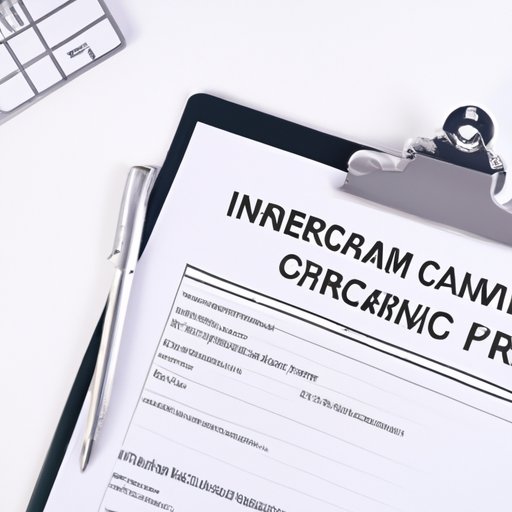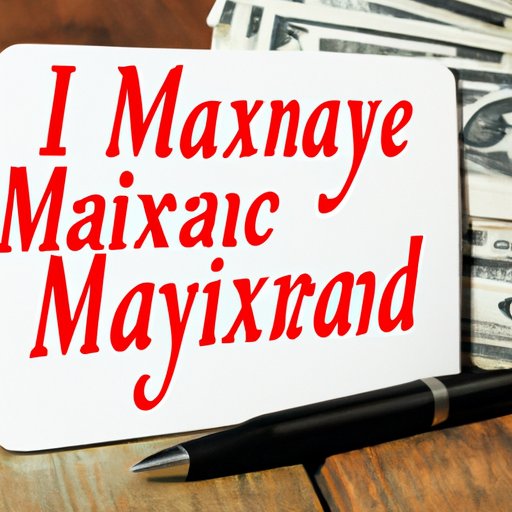
Can I Keep Extra Money from an Insurance Claim?
Dealing with an insurance claim can be frustrating and stressful, but it can feel like a small victory when you receive a payout from your insurer. However, what happens when the payout amount is more than the total cost of repairs, or when you decide to do some repairs yourself? Can you keep the extra money from the insurance claim?
In this article, we will explore the legality of keeping extra money from an insurance claim and provide tips and advice for maximizing your payout while avoiding overpayment to contractors. We will provide expert advice and identify common mistakes you should avoid when dealing with an insurance claim.
Understanding Your Insurance Claim: Tips for Keeping Extra Money
Before we dive into whether or not you can keep extra money from an insurance claim, it’s important to understand the different types of claims and how they work. There are two main types of claims:
1. Actual Cash Value (ACV) Claims – This is the most common type of claim. ACV claims are typically based on the fair market value of the damaged item at the time of the loss. In other words, if your 5-year-old TV was damaged, you won’t receive the same amount you paid for it. Your insurer will calculate its current value and offer a payout based on that.
2. Replacement Cost Value (RCV) Claims – This type of claim covers the actual cost to replace an item at its current market value. Unlike ACV claims, this payout is not based on the item’s depreciated value. RCV claims are more expensive for insurers and are not always offered by all policies.
When dealing with an insurance claim, keep in mind that most insurers will offer you the lowest possible payout. To ensure you get the most out of your insurance claim:
- Document all damages – Take pictures and videos of all damages. This prevents your insurer from underestimating the cost of repairs and hindering your payout.
- Keep receipts – You don’t want to end up with out-of-pocket expenses for repairs. Keep receipts of all repairs and expenses and submit them to your insurer for reimbursement.
- Maximize your payout – If you have an RCV policy, make sure that you get the cost of replacing all damaged items that are covered by your policy.

Maximizing Your Insurance Payout: Legally Keeping Any Extra Money
The question remains – can you legally keep any extra money from an insurance claim? The answer is yes, but it’s a little complicated.
For ACV claims, you can legally keep any money left over after you have repaired or replaced any damaged items that were covered by your policy. However, if you decide not to make the necessary repairs, you may not be entitled to the full payout offered by your insurer. Essentially, insurers think that you have the obligation to use the money you received to restore your property’s pre-loss condition. If you choose to skip repairing and instead keeping the extra money, you could be committing insurance fraud.
For RCV claims, you will only receive the full payout if you repair or replace all the damaged items covered by your policy. Insurers require you to restore the property back to its pre-loss condition. Nevertheless, if you save some costs on repairs and the cost of replacement remains lower than the payout you received, then you can legally keep the extra money.
To maximize your payout and legally keep any extra money:
- Negotiate with your insurer – If you disagree with the insurance settlement, negotiate with them. You can provide supporting documents like proof of ownership and cost of damages.
- Choose a reputable contractor – A contractor typically works hard to complete a job within budget. So, choose a reputable contractor that offers a fair price, follows the local building codes, and offers warranties on their work.
- Use a Public adjuster – Public adjusters can help you maximize your insurance payout. They have experience in handling insurance claims, can document losses properly, substantiate your claim with the carrier, and negotiate with adjusters on behalf of the policyholder.
How to Avoid Overpaying for Repairs After an Insurance Claim
It’s common for contractors to overcharge for repairs after an insurance claim. Unscrupulous contractors capitalize on the insurer’s willingness to pay out claims without verifying the actual value of repairs. Here are some tips for avoiding overpayment:
- Get multiple quotes – This allows you to compare contractors’ prices and services before accepting a bid.
- Read contracts carefully – Review all clauses in the contract before signing. Scrutinize the materials the contractor will use, the duration of work, and the total cost. Be watchful of pre-payment agreements for work that is yet to begin.
- Document everything – Keep accurate records of repairs or replacement, including invoices, receipts, work orders, and work completion certificates.
Negotiating with Contractors to Keep Extra Money from an Insurance Claim
The contract signed between you and the contractor includes an estimated cost of repairs. You can negotiate with the contractor to keep extra money off the estimate. Contractors strike off items or use low-cost materials to stick to an estimate. Negotiable items that can help you keep money from your insurance claim include:
- Materials – you can opt for materials that are less expensive but work just as well
- Labor costs – you can negotiate the cost of labor by getting more bids or by being reasonable with the contractor. You do not need to pay more than it is realistic.
- Markup – Contractors typically add a percentage as markup on their estimate. You can negotiate a lower markup percentage or a fixed markup amount.
6 Common Mistakes That Can Cost You Money After an Insurance Claim
Even if you follow all the right steps, there are still some common mistakes you can make that can cost you money after an insurance claim.
- Rushing to hire a contractor– Many people make the mistake of hiring the first contractor they find, which can lead to hiring an unqualified contractor overcharging for services.
- Not verifying license and insurance – Many contractors perform work without the necessary licenses and insurance. Do your research to ensure that your contractor is authorized to perform the work and insured.
- Jumping to agree to an insurance settlement – Insurance companies may undervalue your damages to pay out less than the total cost of repairs. Consult a public adjuster or hire a lawyer if you don’t agree with your insurer’s settlement offer.
- Paying large upfront deposits – You don’t have to pay large deposits upfront to a contractor. A 10% deposit is enough. The rest of the money should be paid when the work is complete and you are satisfied with the results.
- Disregarding deductibles – Be sure you are aware of any deductibles in your policy. It can be costly to avoid or forget about them.
- Not Documenting Damages – Insurance companies will play down the costs of repairs, unless it is documented correctly. Provide as much information as possible, such as written estimates from contractors or receipts for damages.
Know Your Rights: Keeping Extra Money from Insurance Claims
As a policyholder, you have the right to receive a fair insurance payout. If your insurer is unwilling to pay out extra money, you have several legal actions you can take:
- File a complaint – Most states have insurance departments that can review complaints from consumers. You can file a written complaint with them if you believe your insurance company is behaving unethically.
- File a lawsuit – If your insurance company refuses to comply with the policy or local laws, you can resort to legal action. Hire an experienced lawyer who can walk you through the process.
- Hire a Public adjuster – Public adjusters guarantee the maximum payout from an insurance company. They work with policyholders and insurance companies to reach an agreement without the need for litigation.
Expert Advice: 3 Proven Strategies for Keeping Extra Money from Insurance Claims
We spoke with some experts in the field who provided us with some advice on how to maximize your payout and keep extra money from your insurance claim. Here are the top three strategies;
- Get multiple bids from contractors- Compare bids from different contractors to identify the best costs of repairs while keeping the quality of repairs high. Choose the bid that falls within your budget and aligns with your needs.
- Work with a public adjuster – Public adjusters are knowledgeable about insurance policies so you can ensure you receive the maximum payout amount. They will negotiate on your behalf for a better settlement.
- Review your policy – Before you file an insurance claim, read through your policy to determine what damages are covered. Understanding your policy ensures a better understanding of what is covered or not so that you are more prepared.
Conclusion
In conclusion, it is legal to keep extra money from an insurance claim if you have an ACV policy and after you have paid for all damages repairs and replacement. There is a caveat if the insurers will have to pay out the less money than they would have been obliged if you’ve carried out the repairs. RCV policyholders are required to repair or replace damaged items to receive full payout. Maximizing your insurance claim starts with adequate documentation and negotiation with contractors and insurers. Keep these tips and strategies in mind to ensure you receive enough payout amount for your insurance claim.





